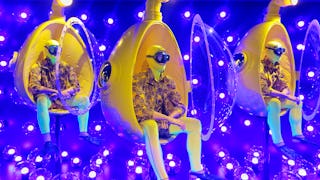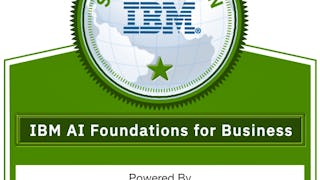Filter by
SubjectRequired
LanguageRequired
The language used throughout the course, in both instruction and assessments.
Learning ProductRequired
LevelRequired
DurationRequired
SkillsRequired
SubtitlesRequired
EducatorRequired
Explore the Service Design Course Catalog
 Status: NewStatus: Free Trial
Status: NewStatus: Free TrialSkills you'll gain: Jest (JavaScript Testing Framework), Django (Web Framework), Version Control, Restful API, Responsive Web Design, Unix Commands, HTML and CSS, Git (Version Control System), GitHub, Relational Databases, Object Oriented Programming (OOP), Database Management Systems, Bootstrap (Front-End Framework), React.js, Mobile Development, SQL, Database Design, Unit Testing, Web Development Tools, Web Development

Università Bocconi
Skills you'll gain: Retail Store Operations, Brand Management, Digital Media Strategy, Global Marketing, Financial Reporting, Communication Strategies, Market Opportunities, Marketing Management, Business Modeling, Business Strategy, Customer experience strategy (CX), E-Commerce, Consumer Behaviour, Storytelling, Market Trend, Product Development
 Status: Free Trial
Status: Free TrialSkills you'll gain: User Experience Design, UI/UX Research, User Centered Design, Design Thinking, Professional Development, Usability, Interviewing Skills, Responsive Web Design, Web Applications, Mobile Development, Mockups, Prototyping, Generative AI

University of Illinois Urbana-Champaign
Skills you'll gain: Instructional and Curriculum Design, Needs Assessment, Instructional Design, Learning Theory, Diversity and Inclusion, Education and Training, Talent Management, Systems Analysis, Job Analysis, Analysis
 Status: Free Trial
Status: Free TrialDeepLearning.AI
Skills you'll gain: Database Design, Software Design Patterns, Database Systems, Software Architecture, System Design and Implementation, API Design, Large Language Modeling, Software Development, Artificial Intelligence, Generative AI, Secure Coding, Application Programming Interface (API), Performance Tuning
 Status: Free Trial
Status: Free TrialSkills you'll gain: Large Language Modeling, Data Literacy, Data Mining, Artificial Intelligence, OpenAI, Generative AI, Data Ethics, Artificial Intelligence and Machine Learning (AI/ML), Big Data, Information Architecture, Strategic Decision-Making, Enterprise Architecture, Cloud Computing, Data Analysis, Data Science, ChatGPT, Deep Learning, Data Strategy, Business Strategy, Business Process Automation

Stanford University
Skills you'll gain: Game Theory, Strategic Decision-Making, Mathematical Modeling, Graph Theory, Bayesian Statistics, Behavioral Economics, Probability, Economics, Markov Model, Algorithms
 Status: NewStatus: Free Trial
Status: NewStatus: Free TrialSkills you'll gain: Data Warehousing, Extract, Transform, Load, Apache Airflow, Web Scraping, Linux Commands, Database Design, SQL, Database Administration, MySQL, Data Pipelines, Apache Kafka, Database Management, Bash (Scripting Language), Shell Script, Database Architecture and Administration, Data Transformation, Data Store, IBM DB2, Jupyter, Generative AI

Starweaver
Skills you'll gain: Customer Relationship Management, Loyalty Programs, Customer experience strategy (CX), Customer Data Management, Customer Insights, Customer Engagement, Customer Service, Customer Retention, Customer experience improvement, Personalized Service, Marketing Strategies, Data-Driven Decision-Making, Technology Strategies, Business Technologies, Automation
 Status: Free Trial
Status: Free TrialMacquarie University
Skills you'll gain: Video Production, Infographics, Course Development, Multimedia, Discussion Facilitation, Content Creation, Constructive Feedback, Instructional Design, Education Software and Technology, Design Thinking, Learning Management Systems, Design, Graphic and Visual Design, Storytelling, Community Development, Emerging Technologies, Virtual Environment, Collaboration, System Configuration, Safety and Security
 Status: Free Trial
Status: Free TrialSkills you'll gain: Cloud Infrastructure, Identity and Access Management, Kubernetes, Google Cloud Platform, Prompt Engineering, Cloud Storage, Containerization, Infrastructure As A Service (IaaS), Cloud Computing Architecture, Cloud Management, Cloud Services, Load Balancing, Cloud Engineering, Application Deployment, Infrastructure as Code (IaC), Virtual Machines, Data Storage Technologies, Cloud Computing, Network Infrastructure, Docker (Software)
 Status: Free
Status: FreeCoursera Project Network
Skills you'll gain: Canva (Software), Design, Digital Design, Design Elements And Principles, Product Design, Color Theory, Intellectual Property, Product Promotion, E-Commerce, Digital Assets, Marketing Materials
Service Design learners also search
In summary, here are 10 of our most popular service design courses
- Meta Full-Stack Developer: Meta
- Management of Fashion and Luxury Companies: Università Bocconi
- Design a User Experience for Social Good & Prepare for Jobs: Google
- Instructional Design Foundations and Applications: University of Illinois Urbana-Champaign
- AI-Powered Software and System Design: DeepLearning.AI
- IBM AI Foundations for Business: IBM
- Game Theory: Stanford University
- IBM Relational Database Administrator: IBM
- Customer Relationship Management: Starweaver
- Online Learning Design for Educators: Macquarie University










